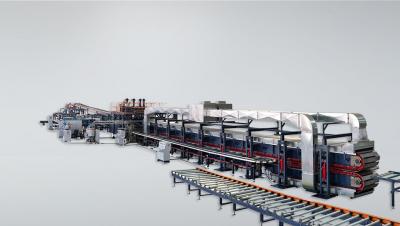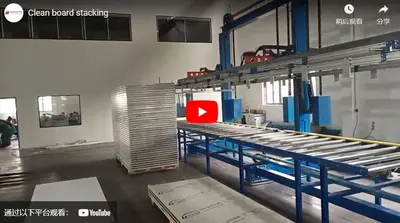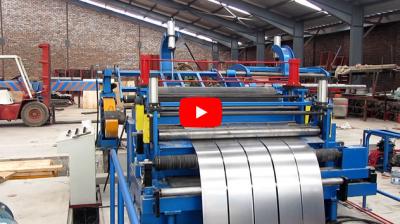Physical Properties of Polyurethane Sandwich Panels —— Concept of Strength
There are many kinds of concepts about strength in polyurethane sandwich panel design, mainly for polyurethane foam core materials and polyurethane sandwich panel products produced by sandwich panel lines. For polyurethane foam core materials, we need to pay attention to compressive strength, bending strength, tensile strength and shear strength, while for polyurethane sandwich panel products, we need to pay attention to bonding strength, flexural bearing capacity and compressive strength, also known as compressive strength, which refers to the relative deformation of polyurethane foam style ε= 40% of the stress per unit area. The direction of false load should be parallel to the product thickness and the direction of foam initiation.
Bending strength: place the polyurethane foam pattern on two supports, apply load at a certain rate in the centre of the pattern, and the maximum bending of the pattern when the specified deformation envelope is equal to 1.5 times the thickness of the pattern. Stress will destroy the load. Tensile strength is the maximum tensile stress per unit area of polyurethane foam when it is stretched to fracture.
The standard polyurethane foam sample prepared under the specified conditions of shear strength, under certain test conditions, applies a force parallel to the adhesive layer to the substrate, making the maximum average shear force that can be borne by the unit bonding area when the bonding surface has a shear failure.
The bonding strength is the maximum load per unit area when the surface steel plate of the polyurethane sandwich panel style is separated from the new polyurethane foam. After reading the bearing capacity, apply the load force and load point on the surface of the polyurethane sandwich panel according to the regulations. When the deflection reaches l0/200 (roof slab) or l0/150 (wallboard), the load at this time is the bending capacity.
Effect of strength on polyurethane sandwich panel
This part will illustrate the main strength, compressive strength, bonding strength and flexural capacity involved in the application and various standards, and their impact on the polyurethane sandwich panel is analyzed. Compressive strength is the ability of polyurethane to resist compressive load without failure. In our application, the compressive strength is mainly used to evaluate the possibility of shrinkage deformation of foam. During the reaction foaming of raw materials, the internal pressure of foam is greater than the external pressure, and the foam continues to expand. When the internal and external pressures of foam are equal, the shape of foam tends to be stable and no obvious changes will occur. With the ageing of foam, the foaming agent in foam condenses, resulting in the internal pressure of foam being less than the external pressure. The maximum internal and external pressure difference after ageing is a standard atmospheric pressure, which is also the origin of the lower limit of the compressive strength of polyurethane rigid foam. The shrinkage of foam will cause the failure of insulation performance of the cold storage body and the insufficient strength of the cold storage body, causing the risk of collapse. Therefore, the greater the compression strength, the lower the possibility of shrinkage deformation of polyurethane foam, and the higher the safety of the polyurethane cold storage board.
The bonding strength represents the ability of the metal surface and polyurethane core of the sandwich panel to resist tensile load without separation. There are generally two ways of bonding metal surface and polyurethane core: glue bonding and polyurethane self-adhesive. The raw materials, process and equipment of sandwich panel production will affect the bonding effect of the two bonding methods. If the bonding effect is not good and the bonding strength is not low, then when the polyurethane sandwich panel is affected by external forces in the application, the metal surface layer may be separated from the polyurethane core material, resulting in the safety risk of personnel falling during installation, daily use and maintenance. Therefore, the greater the bonding strength, the higher the reliability of the polyurethane sandwich board and the longer the service life.
Bending capacity represents the bending resistance of polyurethane sandwich panels after being loaded. The test is to simulate the maximum bending capacity of the sandwich panel when the surface is trampled by people, objects are placed or other pressures are bent to a certain limit. The polyurethane performance, metal surface performance and glue performance are affected. The low bending capacity will cause bending failure or even fracture of the polyurethane sandwich panel. It will also cause the safety risk of personnel falling during installation, daily use and maintenance. Therefore, the greater the bending bearing capacity, the higher the stability of the polyurethane sandwich panel and the stronger the bending resistance.
How to improve the strength of polyurethane sandwich panel
The methods to improve the strength of polyurethane sandwich panels are mainly analyzed from four aspects: raw material formula, temperature, time and auxiliary sandwich panel-making machine in the production process. In terms of raw material formula, we use the current mainstream PIR formula system to analyze. In the formula, the isocyanate is black material with high NCO content and high functionality, the polyol is polyether with high hydroxyl value and phthalic anhydride polyester, and flame retardant is used as little as possible. Reasonable catalyst coordination and reducing the amount of foaming agent can improve the strength of polyurethane, so a reasonable raw material formula is the premise to improve the strength of polyurethane cored board.
In terms of temperature, the appropriate temperature is the necessary condition for the standardization of the reaction and the premise to ensure the intensity. Controlling the temperature of the metal surface ensures the reaction speed of polyurethane foam, provides external heat support for chemical reaction and controls the temperature of the double track, which ensures the forming condition of polyurethane foam so that the track shoes have considerable strength. By controlling the temperature of the measuring plate, the later curing of polyurethane foam is ensured. The better the curing is, the higher the strength is.
The time control mainly controls the wire drawing time and the time interval between touching the top. Through experimental comparison, we found that the length of the time interval is inversely proportional to the compressive strength. The compression strength can be increased by about 10% every time the interval between drawing and topping is reduced by one second. On the premise of ensuring that the polyurethane sandwich panel is filled, the time difference between drawing and topping can be reduced as far as possible, which can effectively improve the compression strength.
In terms of sandwich panel machinery, corona and glue are applied to the surface steel plate to improve the bonding strength. Corona can remove the dust and oil stains on the surface of the steel plate, form lines on the surface of the steel plate, and increase the adhesion. Glue application can increase the adhesion between polyurethane and the steel plate. The lower steel plate is coated with glue PIR foam, which is brittle and does not have self-adhesion when polyurethane is in contact with the lower steel plate. The upper steel plate is bonded by the self-adhesion of polyurethane itself, Generally, glue is not required.


 CN
CN
 EN
EN
 fr
fr  de
de  es
es  it
it  ru
ru  pt
pt  ar
ar  th
th  pl
pl  ro
ro 







 Call us on:
Call us on:  Email Us:
Email Us:  #1809, Jianhu Rd, Keqiao, Shaoxing, Zhejiang, China
#1809, Jianhu Rd, Keqiao, Shaoxing, Zhejiang, China 